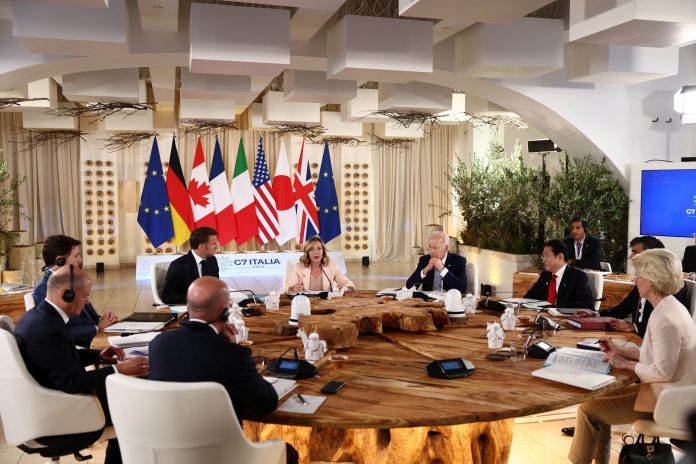US President Joe Biden arrived in Italy ahead of a meeting with leaders of the G7 industrialised democracies.
Russian frozen assets
The G7 summit in Italy opened on Thursday with an agreement reached on a US proposal to back a $50 billion (£39 billion) loan to Ukraine using frozen Russian assets as collateral. Most of the Russian assets are in the European Union. The US proposal would pay off Western allies using interest income from $280 billion worth of Russian assets frozen in Western financial institutions, valued at $3 billion a year, for 10 years or more.
Also, a French official told a briefing for reporters on Wednesday that a political decision by the leaders was in place, but the technical and legal details of the asset utilisation mechanism remained pending.
In April, Biden signed legislation to seize about $5 billion in Russian assets that remained immobilised in US financial institutions. However, the bulk of the money, $190 billion, is in Belgium, with much of the rest in France and Germany.
Adding to the existing difficulties is the fact that if the Russian assets are eventually unfrozen, the unanticipated revenues could no longer be used to repay the loan, requiring a burden-sharing agreement with other countries. Another source of worry for the Europeans is who will be responsible for covering the losses if interest rates fall below expectations or if sanctions that immobilise the funds fail to extend. Russia considers the seizure of its assets after the invasion of Ukraine a theft and has threatened retaliation.
Washington imposes sanctions
The US Treasury Department has announced new sanctions targeting foreign nationals and companies assisting Moscow’s military-industrial base. They include companies based in China that sell semiconductors to Russia. It includes an expansion of secondary sanctions that allow the United States to blacklist any bank around the world that does business with Russian financial institutions already sanctioned. The goal is to prevent smaller banks in China and elsewhere from financing Russian military efforts.
The sanctions also target networks that Russia uses to obtain critical materials to build aerial drones, anti-drone equipment, industrial equipment, and for the nation’s chemical and biological weapons programme, the Treasury Department said.
We are increasing the risk for financial institutions dealing with Russia’s war economy and eliminating paths for evasion, and diminishing Russia’s ability to benefit from access to foreign technology, equipment, software, and IT services, Treasury Secretary Janet Yellen said in a statement.
The Moscow Exchange, Russia’s largest financial marketplace, has announced it will stop trading dollars and euros after they were included in new sanctions.
Meeting in Brussels: Lloyd Austin and Boris Pistorius
In addition, US Defence Secretary Lloyd Austin, in his opening remarks at the Contact Group meeting on military support to Kyiv as part of the NATO defence ministers’ meeting in Brussels, said:
I am proud that this Contact Group has committed more than 98 billion dollars in security assistance to Ukraine since February 2022. And this coalition continues to find innovative and sustainable ways to rush in critical capabilities to meet Ukraine’s most pressing needs.
Germany, for its part, cannot supply Ukraine with more Patriot missile systems due to its limited capabilities, Defence Minister Boris Pistorius said on Thursday. Pistorius said Germany had already delivered two Patriot units to Ukraine and was in the process of delivering a third unit, but insisted other countries could do more. He said:
We have already provided three (Patriot) systems, which means a quarter of our capacities. So, there is no space to provide even more than those three systems. We delivered a lot, but others maybe can do more.
Ukrainian President Volodymyr Zelensky has repeatedly called on Western allies to increase their military support and especially to provide Kyiv with modern air defence systems amid intensified Russian attacks targeting the country’s energy and economic infrastructure. Ukraine needs at least seven more Patriot or similar advanced air defence systems to repel Russian attacks.
